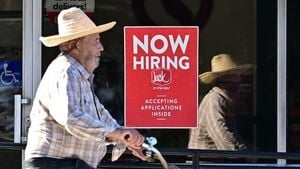Debates over the influence of social media on youth and the increasingly loud discussions surrounding book bans have taken center stage across several communities, with educators, parents, and legislators weighing the potential impacts of these issues.
Social media has become interwoven with daily life, especially for the younger generation. Yet, concerns about its effects are igniting passionate discussions. A growing number of professionals, including mental health advocates, assert there's substantial evidence pointing to the detrimental impacts of social media on young people's mental health. The Australian government, for example, is considering legislation aimed at banning children under 16 from using these platforms.
Danielle Einstein, from Macquarie University, highlighted how anxiety levels among the youth have spiked, with populations reporting increased feelings of isolation and depression. "Social media often amplifies feelings of envy and fear of missing out, leading to significant psychological distress," she remarked. According to her findings, excessive time spent on social media is linked to plummeting self-esteem and heightened anxiety.
While some argue the evidence of harm is still open to interpretation—citing studies like the one combining data from millions of users to conclude there may be no worse effects than consuming potatoes—a more granular look reveals complex interrelationships between mental health and social media use. Factors such as the quality of online interactions can play just as substantial a role as the quantity of time spent online.
Meanwhile, discussions about book bans are erupting across various school districts, like Rutherford County, Tennessee, where the Board of Education has pulled 150 titles from library shelves, tagging them as sexually explicit. This controversial move stems from board member Caleb Tidwell's insistence on enforcing state obscenity laws. He noted during one board meeting, "Yes, we are trying to ban books containing pornographic material." Yet, not all members displayed unwavering support; some voiced concerns over what they termed "political grandstanding," highlighting the division eroding community harmony.
Board member Butch Vaughn articulated his feeling of unease, stating, "It’s created so much bitterness, division... look at the checkout history of the banned books—it is minute!” He reflected on growing up reading these very works without the streaming societal pressures to sanitize literature for young learners.
So far, the fallout from these book bans has led to intensified scrutiny and criticism. Ken Paulson, representing the Free Speech Center at Middle Tennessee State University, criticized the legal foundation of bans. He emphasized, "Never has the Supreme Court deemed literary works obscene merely for depicting sexual content or violence," refuting underlying ideologies fueling the bans.
With mounting evidence supporting the argument against unmonitored social media use among youth, coupled with the tumult over the book bans, it begs the question of how communities can balance freedom of expression with the protection of minors. Advocates on both sides are calling for discussion grounded not only in legal frameworks but also centered on the moral responsibility to cultivate well-rounded and informed future generations.
Returning to the tech debate, the youth pressure is mainly due to the capture of attention by social media platforms and their design protocols which often prey on human psychological weaknesses. Using targeted algorithms, these companies strengthen the compulsion to check notifications or scroll endlessly, which can lead to distressingly negative cycles of behavior.
The conversation surrounding censorship of literature involving challenging themes mirrors the anxieties generated by social media. The idea of restricting access to books deemed inappropriate harkens back to historical instances of similar actions—what board member Stan Vaught likened to censorship seen during the rise of fascism, which provokes fears of broader, societal consequences.
Indeed, this contemporary form of censorship may lead to far-reaching ramifications not just for students and parents but entire communities facing unwarranted legal battles to defend school resources. Ruthless budget cuts resulting from litigation could have lasting impacts on community services.
While school boards are caught between parents’ demands and legislative pressures, the unyielding dialectic invites broader societal reflection on both youth well-being and literary freedom. Are the choices we make defending ideals or are they creating unnecessary divisions?
Back and forth continues as board members struggle with their dual roles of educators and community representatives. Vice versa, the stakes are high for mental health and educational accessibility, each impacting youth futures. The message seems clear: discussions on both fronts require attention and thoughtful consideration.
Rutherford County's saga reflects national trends, and whether through social media regulations or school literature, communities are grappling with how to safeguard young minds without stifling educational exploration.
The newly banned books list will be reviewed in sixty days. Discussions about both social media and literature resonate deeply as they shape not only current communities but their future as well. Are we stifling creativity and undermining discourse through regulation? Or are we taking responsible steps to shield our youth? It's this balancing act of ideas, opinions, and policies that's actively brewing across the country.
Nevertheless, the call for reasoned discussion rather than divisive rhetoric seems to echo stronger than ever. Addressing concerns through balanced debate may be the best approach as society trudges through these complicated waters of youth expression and protection.



